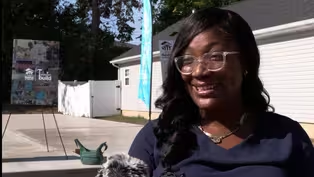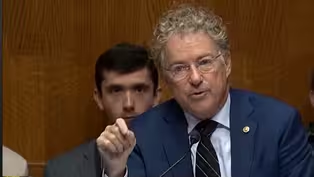
Alzheimer's Advancements and Impact on Kentuckians
Clip: Season 4 Episode 59 | 5m 6sVideo has Closed Captions
What advancements in the fight against Alzheimer's mean for Kentucky families.
With new medications, groundbreaking discoveries, and innovative prevention strategies emerging, the fight against Alzheimer's is gaining momentum. Our Christie Dutton sat down with Dr. Gregory Cooper, a leading authority in the field of Alzheimer’s research, to discuss what these advancements mean for the future of Alzheimer's.
Problems playing video? | Closed Captioning Feedback
Problems playing video? | Closed Captioning Feedback
Kentucky Edition is a local public television program presented by KET

Alzheimer's Advancements and Impact on Kentuckians
Clip: Season 4 Episode 59 | 5m 6sVideo has Closed Captions
With new medications, groundbreaking discoveries, and innovative prevention strategies emerging, the fight against Alzheimer's is gaining momentum. Our Christie Dutton sat down with Dr. Gregory Cooper, a leading authority in the field of Alzheimer’s research, to discuss what these advancements mean for the future of Alzheimer's.
Problems playing video? | Closed Captioning Feedback
How to Watch Kentucky Edition
Kentucky Edition is available to stream on pbs.org and the free PBS App, available on iPhone, Apple TV, Android TV, Android smartphones, Amazon Fire TV, Amazon Fire Tablet, Roku, Samsung Smart TV, and Vizio.
Providing Support for PBS.org
Learn Moreabout PBS online sponsorshipSunday is World Alzheimer's Day.
It's every September 21st.
It's a day to raise awareness of the global impact of this devastating disease with new medications, groundbreaking discoveries, and innovative prevention strategies emerging.
The fight against Alzheimer's is gaining momentum.
Our Christine sat down with Doctor Gregory Cooper, a leading authority in the field, to discuss what these advancements mean for the future of Alzheimer's.
It's part of the next chapter initiative focused on the rewards and challenges of growing older.
Joining me is Doctor Gregory Cooper from the Norton Neuroscience Institute.
Now, Doctor Cooper, it seems like every time we open the news, there's some something new and exciting about Alzheimer's research.
And you were just telling me about this new treatment.
That seems really promising.
People are already benefiting from.
What is that?
Right.
So in the last two years we've had a new class of medications come out.
They're called anti amyloid treatments.
The idea in Alzheimer's disease is that the deposition of this protein, amyloid, is what leads to many of the changes we see.
Now we have medications that remove that amyloid.
And they're not a cure, but they significantly slow down the progress of this disease.
So early detection early diagnosis is key right.
Absolutely critical.
If people have advanced to a more moderate or severe stage, they may not even be candidates.
Okay.
So when maybe you start noticing something from a loved one, their memory starting to fade, or you start to become concerned, the sooner you can get them to doctor, the sooner the better.
Really?
To get an accurate diagnosis, and then to consider treatment options.
Okay.
And also now there's a blood test that can find a biomarker.
Tell us about that.
Right.
So that's an exciting field.
People have been working on this for years.
Looking at biomarkers.
These are proteins in the body that tell us whether someone is likely or unlikely to have Alzheimer's disease.
Now, up until now, we have primarily looked in spinal fluid, which is a procedure that people would have to go through, or a Pet scan, which is often not available now.
Their blood tests that are highly accurate.
Now they have to be used in the right situation, but in the right situation, they're highly accurate and give us great information about the presence of Alzheimer's disease.
Okay, so that would mean Alzheimer's has to already be.
Is there an age that you can say, well, they're approved for people over the age of 50?
Okay.
And you would have to have some evidence on your exam of memory impairment.
So if someone in their 40s or 50s, even without evidence of memory loss, took the test.
We don't really know how to interpret it.
But in someone that has the findings of Alzheimer's disease, this test can help confirm that that diagnosis.
Well, that's exciting.
And also, exciting new, something findings about preventing Alzheimer's.
Right.
So this is a very interesting area.
It has been said now that up to 45% of dementia is preventable.
Well, that's a really large number.
And there have been studies that have been looking into kind of, really a lifestyle approach, a lifestyle approach, looking at exercise, looking at diet, looking at, you know, nutrition and, cognitive exercise, socialization, all of those things.
Can that help lower our risk of developing prevention?
It looks like it can.
It looks like it can actually improve our overall level of cognition, but also may help prevent the onset of cognitive impairment later on.
So diet and exercise.
Yeah.
The tried and true.
Yeah.
To put the work in sort of that's a great thing.
Yeah.
Okay.
And also, I've been seeing in the news about we think of ozempic as treating, diabetes, but it may show some promise for all time.
It may.
So we'll know for sure.
In early December, there's an annual meeting, called Tab.
And, the sponsor of this trial will be presenting their results.
And we're all hopeful that that's going to be one more tool in our armamentarium and one more medication that particularly, if used early on, can help slow down the progress of this disease.
That would be a huge breakthrough, right?
It would be a very big deal.
That's right.
Wow.
This is all very exciting news.
Doctor Gregory Cooper, thank you so much for sharing your expertise with us.
Thank you for having me.
And thank you, Christy.
If you feel like your loved ones memory is slipping and you want to learn more.
The Norton Neuroscience Institute is hosting its annual Neuro Expo on Saturday, October the 11th at Louisville Marriott East.
You can hear from experts about Alzheimer's, multiple sclerosis, migraines and strokes.
This is a free event, but space is limited.
For more information, visit Norton Healthcare online at Norton Health care.com or call 502629 1234.
How One Community is Building Up Its Neighbors
Video has Closed Captions
Clip: S4 Ep59 | 3m 6s | Program build up women through homeownership. (3m 6s)
Senator Paul Clashes with Former CDC Chief Over Vaccine
Video has Closed Captions
Clip: S4 Ep59 | 1m 46s | Sen. Paul questions need for newborns to get hepatitis B vaccine. (1m 46s)
Task Force Explores Ways to Make Cafeteria Meals Healthier
Video has Closed Captions
Clip: S4 Ep59 | 3m 27s | State lawmaker wants to make changes to what's allowed in school meals. (3m 27s)
Providing Support for PBS.org
Learn Moreabout PBS online sponsorship
- News and Public Affairs

Top journalists deliver compelling original analysis of the hour's headlines.

- News and Public Affairs

FRONTLINE is investigative journalism that questions, explains and changes our world.












Support for PBS provided by:
Kentucky Edition is a local public television program presented by KET


